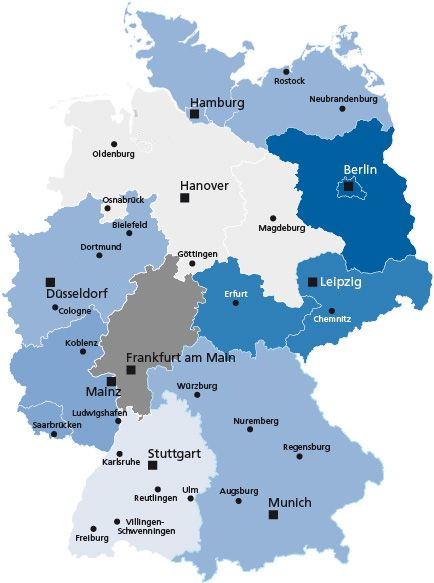Bundesbank: An important partner at your side
With a total of nine Regional Offices, the Bundesbank is represented in all of the country's major regions. Each Regional Office is responsible for at least one federal state, with some being responsible for several. The Regional Offices are currently supported by 31 branches. The Regional Office in Baden-Württemberg, for example, is located in the city of Stuttgart, which is also home to one of the Bundesbank's branches. There are also a number of additional branches in the region, namely in Karlsruhe, Reutlingen, Freiburg, Villingen-Schwenningen and Ulm.
The branches and Regional Offices carry out different tasks. The Bundesbank's Regional Office network, spanning from Hamburg to Munich and from Düsseldorf to Berlin, employs around 2,600 staff members in total. In addition, around 2,600 staff work at the Bank's branches.
Regional Offices: the on-site supervisors
One of the key tasks of the staff members working at the Regional Offices is to supervise the banks and financial service providers operating in their respective region(s). The supervisors are responsible for analysing and evaluating the notifications and reports that credit institutions are required to submit on a regular basis, which, for instance, includes their annual accounts. The Bundesbank's supervisors also regularly conduct supervisory meetings with the senior management of the supervised institutions. The bank inspectors assess whether the inspected institutions have sufficient capital and an adequate supply of liquidity in line with the statutory provisions. Furthermore, they assess whether the banks are adhering to the prescribed minimum requirements with regard to the handling of risks.
The performance of credit assessments is a further important function that is fulfilled by Regional Office staff in the implementation of monetary policy measures. One of the core tasks of a central bank is to supply banks with cash in exchange for adequate collateral. This collateral can, for instance, consist of a credit claim vis-à-vis an enterprise. However, the enterprises which are the debtors of the credit claims have to be considered "eligible" by the Bundesbank. To this end, staff at the Regional Offices examine the balance sheets of these enterprises. Irrespective of these checks, enterprises may also request that a credit assessment be conducted by the Regional Offices.
The provision of economic education at the local level is a further important task of the Regional Offices. Bundesbank experts regularly inform and update members of the general public in understandable language about issues, such as cash, monetary policy and financial markets, at regional events, such as the "Bundesbank Forum". These events are open to all members of the public. Moreover, staff at the Regional Offices offer seminars for teachers and school pupils on the topic of current monetary policy developments.
Branches: first port of call for all cash matters
The Bundesbank's branches are the first port of call for all cash-related matters in Germany. Staff at the Bank's branches, which number 31 at present, are responsible for bringing freshly printed banknotes and newly minted coins into circulation. From these branches, cash is distributed to banks and major customers, such as supermarkets, for example, which in turn use it to fill up their ATMs or cash holdings. The daily takings are then transported back to the Bundesbank by cash-in-transit (CIT) companies, where the cash is then credited to the customer's account. One important task of the branches is to check the deposited banknotes and coins for authenticity and quality. Any soiled or damaged banknotes and coins are destroyed and replaced with new ones.
This is why cash is a very secure means of payment. As a general rule, the higher the quality of the banknotes in circulation, the more difficult it is for counterfeiters to introduce fake banknotes into the cash cycle. Members of the public in possession of damaged banknotes or coins can take these to any Bundesbank branch and exchange them for new ones. With regard to banknotes, however, the owner must be in possession of at least 50% of the banknote or be able to prove that the remainder of the note has been destroyed. In particularly tricky cases, the damaged banknotes or coins are submitted to the Bundesbank's National Analysis Centre in Mainz, where the Bank's specialists take a closer look at them and, where appropriate, arrange for a reimbursement to be paid out.
